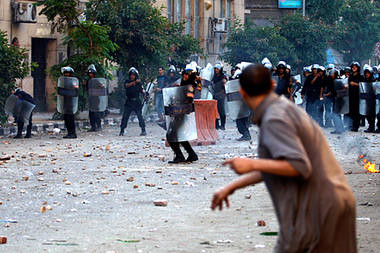
Egyptian clash with security forces in Cairo on June 29, 2011. Youth are demanding justice for those wrongfully killed and imprisoned by the military regime. Despite a change of government, the regime is still a client of US imperialism., a photo by Pan-African News Wire File Photos on Flickr.
June 28, 2011
Egyptian Security Forces Clash With Protesters
By THE ASSOCIATED PRESS
CAIRO (AP) — Egyptian security forces and protesters clashed for a second successive day in central Cairo on Wednesday in scenes not seen since the uprising that toppled Hosni Mubarak in February.
Riot police were deployed around the Interior Ministry and were using tear gas to keep the protesters at bay. The demonstrators were responding with rocks and firebombs. The clashes left streets littered with rocks and debris and sent a cloud of tear gas over the area.
So far, Wednesday's violence was on a much smaller scale than the clashes the previous evening, when some 5,000 protesters battled the police for hours overnight. But regardless of their size, the clashes are likely to widen the rift between many Egyptians and the police, blamed for many of the human rights abuses during Mubarak's years in power.
The clashes are also likely to delay efforts aimed at allowing the police to fully take back the streets after their unexplained disappearance following deadly clashes with protesters during the uprising and the deployment of army troops in their place in late January.
Dozens of protesters and policemen were injured in the violence Tuesday and Wednesday, but there were no exact figures immediately available. Ambulances were ferrying the wounded to hospitals and volunteer doctors and nurses were treating others on sidewalks.
The scenes were reminiscent of the 18 days of protests that toppled Mubarak's 29-year regime.
Some of the protesters used scarves to fend off tear gas, pelted police cars with rocks and advanced when the riot police lines retreated. But while the main chant back in January and February was "The people want to oust the regime," screams of "the people want to oust the field-marshal" dominated on Tuesday and Wednesday.
It's a reference to Mohammed Hussein Tantawi, Mubarak's longtime defense minister and chairman of the Supreme Council of the Armed Forces that has taken over after the former president stepped down. Tantawi is seen by some of the youth groups behind the uprising to be a key member of the Mubarak regime. They charge that his policies are designed to keep the old order, and also accuse him of deliberately slowing down the process of purging Mubarak loyalists and failing to reform the hated Interior Ministry and its security agencies.
Many of the protesters who took to the streets on Tuesday are believed to be relatives of some 850 people killed during the uprising that ousted the former president, and are frustrated over what they perceive as the slow pace of prosecution of police officers believed to be responsible for the deaths.
The clashes began Tuesday evening at Tahrir square, the epicenter of the Jan. 25-Feb. 11 uprising, but later moved to streets leading to the nearby Interior Ministry when authorities ordered the riot police to pull back from the vast plaza. Tahrir square was closed to traffic on Wednesday.
The military, which has taken over from Mubarak, issued a statement on its Facebook page saying the clashes were designed to "destabilize the country" and drive a wedge between the groups behind the uprising and the security forces. It called on Egyptians not to join the protests.
A key youth group, April 6, described the police's handling of the latest protests as "brutal" and called in a statement for a sit-in in central Cairo to protest what it said was the failure to implement many of the demands from the uprising and also to show solidarity with the families of the uprising's victims.
No comments:
Post a Comment